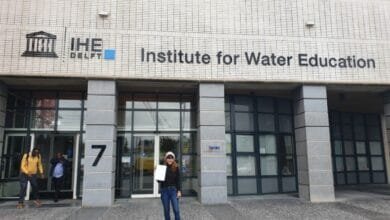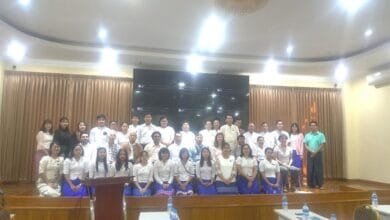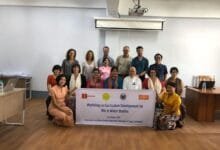
Featured Tha Peng Cung, a young water expert
“Water isn’t just a subject, it’s a human right”
Tha Peng Cung, one of the emerging young water professionals from Myanmar, is currently working as a staff officer for the Irrigation and Water Utilization Management Department, Ministry of Agriculture, Livestock and Irrigation. Ethnically, he belongs to Chin and graduated from Technological University (Kalay) with a Civil Engineering Degree. Further, he did his Master of Integrated Water Management (MIWM) running by the International Water Center and hosted by Griffith University.
Motive for becoming a young water expert
During he was in his primary school, every household in his neighborhood had to fetch water from the public taps implemented by UNICEF. Years later, some households in a favorable well off directly connected pipes from water sources to their houses, and some even fenced the public pipe stands into their courtyard. This sort of privatizing water sources and public pipe stands is leading to which, others can’t get enough water anymore. His family was one of the households that had been suffered from these situations. Also, during his undergrad study year, he volunteered as a survey conductor for a rural water supply project financed by UNDP in Falam Township, Chin State. Subconsciously, all these occurrences have shaped him to become the one who has a keen interest in water.
Career life
After he had graduated, he was awarded a scholarship a program called Intensive University Preparation Program run by Kant Kaw Education Center for a year in 2012. Then, he worked as a translator for Kumudra and Modern journal and as a project coordinator at Mekong Economics Ltd. After all these years, he contemplated that he wanted to become an expert in a field he is passionate. Thus, he threw himself into the water sector and became a staff officer at Irrigation and Water Utilization Management Department.
Master student life at International Water Center
He researched a lot about water while working as a staff officer and aspired to study abroad to learn more in-depth.
“I did apply every available scholarship related to water, keeping in mind that it’s my responsibility to apply whether I get the scholar or not. I self-studied English and took the IELTS test twice,”
Tha Peng Cung explained how he prepared to study abroad. With all of his efforts, he got the Australian Award Scholarship and attended the Master of Integrated Water Management (MIWM) course at Griffith University in Brisbane, Australia.
“Once, I studied a MOOC from the University of Geneva focusing on Water Resources Management and Policy, in which, I realized my interest in Water Governance and Project Management. These areas become my main interest and the master course module also fits completely,” Tha Peng Cung explained the reason he chose MIWM.
“I was very fortunate to have such great roommates in a foreign land for a year and a half. My roommates are friendly and helpful but I had some difficult time in communicating with them due to the language barrier” he said.
“According to the nature of the course, we had to go several site visits including the North Stradbroke Island, Oxley Creek Wastewater Treatment Plant, Brisbane River Field Trip, Great Barrier Reef, and the University of Western Australia in Perth,” he mentioned about his great experience.
 Brisbane River Field Trip
Brisbane River Field Trip  North Stradbroke Island Field Trip
North Stradbroke Island Field Trip  Oxley Creek Wastewater Treatment Plant
Oxley Creek Wastewater Treatment Plant  Collaborative Planning Field Trip to Ipswich
Collaborative Planning Field Trip to Ipswich  Perth Field Trip
Perth Field Trip
Milestone in his life
Regarding to water shortage problems irrespective of the season in his region, he had a desire to research on the water scarcity in Chin state. Hence, he decided to carry out a research on “Water Governance in Chin State from a Political- Ecological Perspective and Integrated Water Management Perspective” choosing Hakha, the capital of Chin State, as a case study for his final project of the master course. He studied on the water governance and policies in Chin State Government, their effectiveness towards sustainable water supply in coping with water scarcity, and how to build upon the existing policies to improve the water governance considering economic efficiency, environmental sustainability, and social equity.
“There were lots of fragmentations in the water governance including: Functional fragmentation – gap and overlap of responsibilities between governmental departments, NGOs and INGOs; Social fragmentation – caused by the disconnection of communication among different levels of stakeholders; and finally, Institutional fragmentation – policy gaps or it happens when there is no coordination within multilevel decision-making bodies or governments.. Moreover, I interviewed 31 people including members of advisory group of National Water Resources Management Committee, the community, government, NGOs, INGOs and, none of the respondent from Chin State are aware of having National Water Policy (2014) and 97% of the Chin population do not understand the notion of the human right to water” he said.
“Three types of water scarcity were found in Hakha:
1) social scarcity which is the inequity in water allocation due to the status of well off or positions in certain department;
2) environmental scarcity where the quality of available water is quite low;
3) economic scarcity which is the lack of necessary infrastructure due to poor economic conditions and lack of investment.
My research findings indicate that the fundamental causes to water shortage in Chin State are expected to be superficial decentralization, lack of long-term commitment, and gaps in funding, capacity, information, accountability, institution, and functional allocation. Regarding public consultation for the projects, there are 8 levels based on the international criteria: manipulation, therapy, informing, consultation, placation, partnership, delegated power, and citizen control. However, public consultations in Myanmar emphasize in the two bottom-most range in which no citizen power in the projects resulting in not being able to transform to transdisciplinary approach,”
Tha Peng Cung mentioned his findings from the research which became a great milestone in his life.
Recommendation for the younger generation
“Water isn’t just a subject, it’s a human right. Everyone has the right to sufficient, safe, accessible, and affordable water. Hence, everyone should learn more about water to achieve it. Moreover, if anyone has an idea to study abroad by any chance, I would like to encourage as you can broaden your knowledge and explore different cultures. I also would like to recommend asking for support and learning from seniors or anyone with experience in relating fields during the preparation process. Last but not least, “Do not be shy/worry to speak out and express your opinion whenever you are in the situation,” he suggested considering the optimistic vision of the future.









